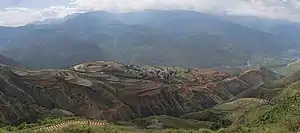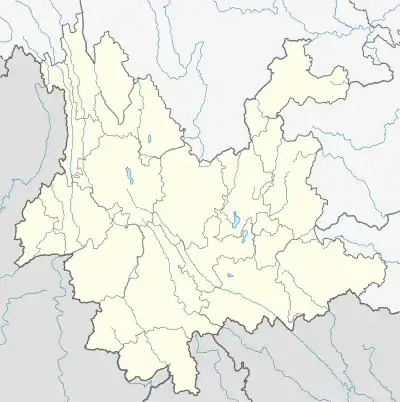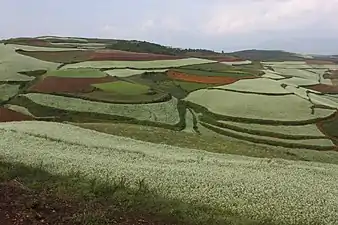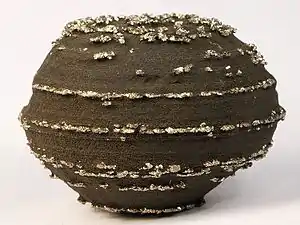Dongchuan
东川区 | |
|---|---|
 Luoxianggou | |
.png.webp) Location of Dongchuan (pink) within Kunming (yellow), Yunnan (light grey) | |
 Dongchuan Location of the district seat in Yunnan | |
| Coordinates (Dongchuan government): 26°04′58″N 103°11′16″E / 26.0829°N 103.1878°E | |
| Country | People's Republic of China |
| Province | Yunnan |
| Prefecture | Kunming |
| Area | |
| • Total | 1,858 km2 (717 sq mi) |
| Population | |
| • Total | 302,000 |
| • Density | 160/km2 (420/sq mi) |
| Postal code | 654100 |
| Area code | 0871 |
| Website | www |
| Dongchuan, Kunming | |||||||||
|---|---|---|---|---|---|---|---|---|---|
| Traditional Chinese | 東川區 | ||||||||
| Simplified Chinese | 东川区 | ||||||||
| Literal meaning | East River District | ||||||||
| |||||||||
Dongchuan District[lower-alpha 1] is one of seven districts of the prefecture-level city of Kunming, the capital of Yunnan Province, People's Republic of China. The district was approved to form from the former Dongchuan City by the State Council on December 6, 1998.[2]
History
Dongchuan was upgraded to a city in 1958. In 1998 Dongchuan was merged into Kunming and became one of its districts.
Geography
Dongchuan is in the north of Kunming's administrative area and borders Sichuan to the north.
The district's highest point, Jiaozi Snow Mountain, is 4330 meters high, and its lowest point is 695 meters. As of 2000 Dongchuan has a population of 275,564. As of 2006, the population was 302,000.[3]
The area around Huagou in the Wumeng mountains has become famous through photographers who discovered the unique local landscape and its Red Earth scenery in the 1990s.[4]
Administrative divisions
Th administrative divisions of Dongchuan District are:
- Tongdu Subdistrict (铜都街道)
- Bigu Subdistrict (碧谷街道)
- Tangdan Town (汤丹镇)
- Yinmin Town (因民镇)
- Awang Town (阿旺镇)
- Wulong Town (乌龙镇)
- Hongtudi Town (红土地镇)
- Tuobuka Town (拖布卡镇)
- Shekuai Village (舍块乡)
Climate
| Climate data for Dongchuan District (1991–2020 normals, extremes 1981–2010) | |||||||||||||
|---|---|---|---|---|---|---|---|---|---|---|---|---|---|
| Month | Jan | Feb | Mar | Apr | May | Jun | Jul | Aug | Sep | Oct | Nov | Dec | Year |
| Record high °C (°F) | 30.3 (86.5) |
33.0 (91.4) |
35.8 (96.4) |
37.9 (100.2) |
40.1 (104.2) |
38.5 (101.3) |
38.1 (100.6) |
37.3 (99.1) |
37.9 (100.2) |
33.9 (93.0) |
31.2 (88.2) |
29.7 (85.5) |
40.1 (104.2) |
| Mean daily maximum °C (°F) | 20.3 (68.5) |
23.3 (73.9) |
27.7 (81.9) |
30.3 (86.5) |
31.0 (87.8) |
30.5 (86.9) |
30.3 (86.5) |
30.3 (86.5) |
28.4 (83.1) |
25.1 (77.2) |
23.4 (74.1) |
20.0 (68.0) |
26.7 (80.1) |
| Daily mean °C (°F) | 12.9 (55.2) |
16.0 (60.8) |
20.2 (68.4) |
23.1 (73.6) |
24.5 (76.1) |
24.8 (76.6) |
24.8 (76.6) |
24.4 (75.9) |
22.6 (72.7) |
19.4 (66.9) |
16.5 (61.7) |
12.7 (54.9) |
20.2 (68.3) |
| Mean daily minimum °C (°F) | 7.1 (44.8) |
10.1 (50.2) |
14.1 (57.4) |
17.3 (63.1) |
19.5 (67.1) |
20.8 (69.4) |
21.1 (70.0) |
20.4 (68.7) |
18.8 (65.8) |
15.5 (59.9) |
11.4 (52.5) |
7.3 (45.1) |
15.3 (59.5) |
| Record low °C (°F) | −2.8 (27.0) |
−1.9 (28.6) |
−0.7 (30.7) |
5.9 (42.6) |
8.3 (46.9) |
13.0 (55.4) |
14.9 (58.8) |
14.5 (58.1) |
9.8 (49.6) |
7.5 (45.5) |
0.6 (33.1) |
−7.5 (18.5) |
−7.5 (18.5) |
| Average precipitation mm (inches) | 16.4 (0.65) |
10.8 (0.43) |
14.6 (0.57) |
23.4 (0.92) |
68.7 (2.70) |
153.0 (6.02) |
138.4 (5.45) |
110.8 (4.36) |
89.2 (3.51) |
65.1 (2.56) |
21.6 (0.85) |
6.8 (0.27) |
718.8 (28.29) |
| Average precipitation days (≥ 0.1 mm) | 3.7 | 3.7 | 4.7 | 6.4 | 10.9 | 16.2 | 17.7 | 15.9 | 13.5 | 12.6 | 4.6 | 2.7 | 112.6 |
| Average snowy days | 0.9 | 0.7 | 0.1 | 0 | 0 | 0 | 0 | 0 | 0 | 0 | 0.1 | 0.3 | 2.1 |
| Average relative humidity (%) | 51 | 43 | 39 | 42 | 52 | 67 | 72 | 71 | 70 | 70 | 60 | 57 | 58 |
| Mean monthly sunshine hours | 211.2 | 207.2 | 240.9 | 232.3 | 195.4 | 132.7 | 126.5 | 138.5 | 125.3 | 134.3 | 187.4 | 197.3 | 2,129 |
| Percent possible sunshine | 64 | 65 | 64 | 60 | 47 | 32 | 30 | 35 | 34 | 38 | 58 | 61 | 49 |
| Source: China Meteorological Administration[5][6] | |||||||||||||
Ethnic groups
Yi ethnic subgroups in Dongchuan are Black Yi 黑彝, White Yi 白彝, and Dry Yi 干彝 (Dongchuan City Gazetteer 1995:744). The Black Yi and Dry Yi speak Eastern Yi dialects, while the White Yi speak Chinese. Autonyms of Yi subgroups in Dongchuan are Nisepu 尼色普 and Gepu 戈普.
Other ethnic groups in Dongchuan are Miao (Big Flowery Miao 大花苗 subgroup), Hui, and Han (Dongchuan City Gazetteer 1995).
Economy
Dongchuan Special Industrial Park.[7]
The Dongchuan mineral resource is rich and it has one of six biggest copper deposits in China. It is verified that there are 3.35 million tons of copper, accounting for a third of the copper reserves in the province.[3]
|
Notes
References
Citations
- ↑ EB (1878), Vol. V, "China".
- ↑ 东川区历史沿革 (in Simplified Chinese). xzqh.org. 2014-11-05. Retrieved 2019-07-19.
- 1 2 "Kunming Pengcheng Trade Co. Ltd". Archived from the original on 2008-07-04. Retrieved 2008-06-14.
- ↑ Dongchuan Red Soil at Chinatrekking
- ↑ 中国气象数据网 – WeatherBk Data (in Simplified Chinese). China Meteorological Administration. Retrieved 9 April 2023.
- ↑ 中国气象数据网 (in Simplified Chinese). China Meteorological Administration. Retrieved 9 April 2023.
- ↑
Bibliography
- Baynes, T. S., ed. (1878), , Encyclopædia Britannica, vol. 5 (9th ed.), New York: Charles Scribner's Sons
- Area Code and Postal Code in Yunnan Province
External links
- Dongchuan District Public Information Network - Official Website



